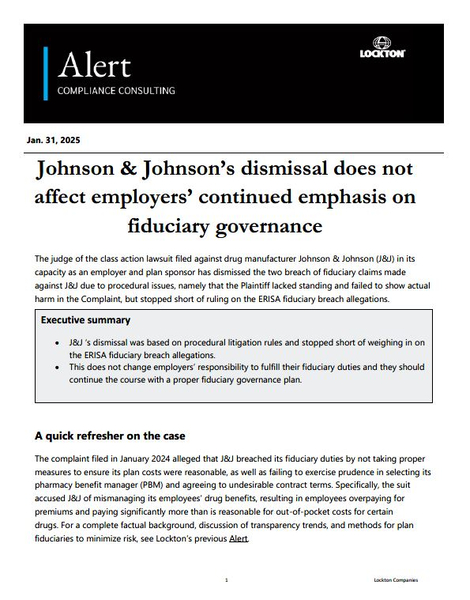The judge of the class action lawsuit filed against drug manufacturer Johnson & Johnson (J&J) in its capacity as an employer and plan sponsor has dismissed the two breach of fiduciary claims made against J&J due to procedural issues, namely that the Plaintiff lacked standing and failed to show actual harm in the Complaint, but stopped short of ruling on the ERISA fiduciary breach allegations.
Executive summary
J&J ‘s dismissal was based on procedural litigation rules and stopped short of weighing in on the ERISA fiduciary breach allegations.
This does not change employers’ responsibility to fulfill their fiduciary duties and they should continue the course with a proper fiduciary governance plan.
A quick refresher on the case
The complaint filed in January 2024 alleged that J&J breached its fiduciary duties by not taking proper measures to ensure its plan costs were reasonable, as well as failing to exercise prudence in selecting its pharmacy benefit manager (PBM) and agreeing to undesirable contract terms. Specifically, the suit accused J&J of mismanaging its employees’ drug benefits, resulting in employees overpaying for premiums and paying significantly more than is reasonable for out-of-pocket costs for certain drugs. For a complete factual background, discussion of transparency trends, and methods for plan fiduciaries to minimize risk, see Lockton’s previous Alert (opens a new window).
This lawsuit is an example of the recent uptick in lawsuits, such as a prominent case involving Wells Fargo, regarding compliance with recent transparency rules, reinforcing the need for ERISA fiduciary governance.
About the ruling
The judge dismissed the two breach of fiduciary duty claims against J&J based on procedural litigation rules but stopped short of weighing in on the ERISA fiduciary breach allegations.
The court dismissed the first claim, that J&J’s breach involving PBM selection and administration resulted in higher premiums paid by the former employee, based on circuit precedent that stating alleged premium increase is paid as too speculative to establish standing to maintain a case. The second claim of breach of fiduciary duty was dismissed because the plaintiff’s other out-of-pocket costs created a situation where even the amount paid for the expensive drugs in question did not have a bearing on what the plaintiff ultimately paid.
Lockton comment: The judge determined that the Plaintiff’s allegations that J&J failed to produce plan documents was sufficiently pled so that issue will proceed, and the court will determine whether J&J’s written request procedures in this situation satisfied ERISA’s plan document production requirements.
Although both breach of fiduciary claims were dismissed by the court based on procedural issues, the judge did not rule that J&J, as the plan fiduciary, breached (or didn’t breach) its fiduciary obligations to the plan in the administration of its prescription drug program.
Lockton Comment: Note, this may not be the end of this litigation, as the judge dismissed without prejudice and the plaintiffs have 30 days to file another amended complaint to address deficiencies. Additionally, a similar Wells Fargo lawsuit alleging fiduciary breaches is still ongoing.
Stay the fiduciary course. As stated above, there was no ruling with regard to the fiduciary breach allegations. Employers should still be working to ensure appropriate plan oversight and administration, and engaging in a prudent process when selecting and monitoring plan service providers.
Employer plan sponsors, as fiduciaries, should continue to exercise caution and care in executing their fiduciary duties to the plan. Actions steps may include:
Identify plan fiduciaries and implement fiduciary training to provide support in exercising care and compliance with fiduciary duties.
Consider creating a formal fiduciary committee for health and welfare benefits, and work with legal counsel to draft a formal committee charter.
Review of PBM, third-party administrator (TPA) and other service provider contracts, including review of contract terms, fees, services provided, performance guarantees, rebate structure, etc...
Negotiate indemnification provisions within service providers’ contracts to include protections that compensate the plan or plan sponsor for errors caused by a service provider.
Work with legal counsel to properly form a health and welfare benefit committee.
Review applicable insurance policies (e.g., E&O, D&O) to determine if any fiduciairy liability coverage is provided.
Consider fiduciary liability insurance to protect the plan sponsor and other fiduciaries from liability for fiduciary breach.
Ensure any required fidelity bonds are in place to protect the plan from losses caused by fraud or dishonesty.
For clients, Lockton has created a self-help kit called Lockton Fiduciary Governance Toolkit to help its clients ensure they are well-versed on and are meeting their fiduciary duties.
Not legal advice: Nothing in this alert should be construed as legal advice. Lockton may not be considered your legal counsel, and communications with Lockton's Compliance Consulting group are not privileged under the attorney-client privilege.


